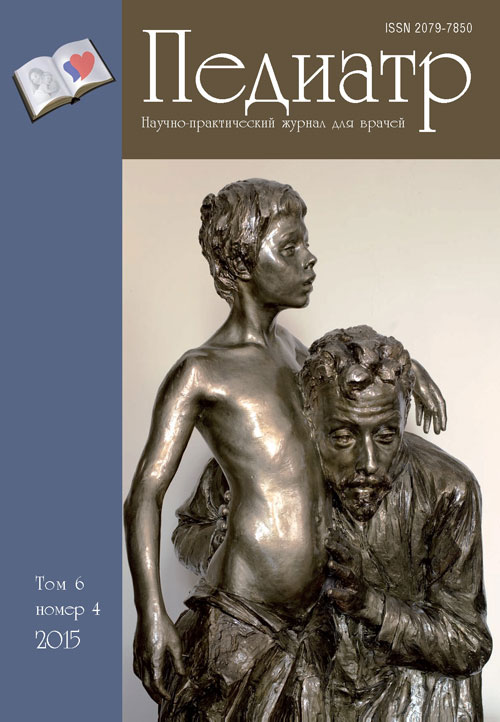Отношение женщин в ситуации ЭКО к беременности, ребенку, материнству
- Авторы: Маленова А.Ю.1, Кытькова И.Г.1
-
Учреждения:
- ФГБОУ ВПО «Омский государственный университет им. Ф. М. Достоевского»
- Выпуск: Том 6, № 4 (2015)
- Страницы: 97-104
- Раздел: Статьи
- URL: https://journals.eco-vector.com/pediatr/article/view/1375
- DOI: https://doi.org/10.17816/PED6497-104
- ID: 1375
Цитировать
Аннотация
Цель исследования - изучение особенностей отношения женщин в ситуации ЭКО к беременности, ребенку, материнству. Выборка: 100 замужних беременных женщин в возрасте от 28 до 42 лет (первая беременность первого триместра, осложнений в анамнезе нет), представляющих две группы по 50 человек: 1) после искусственного оплодотворения (эмпирическая группа); 2) в ситуации естественной беременности (контрольная группа). С помощью тестирования определены ведущие мотивы беременности, типы отношения к себе, к беременности, к ребенку, к окружающим, преобладающие установки в сфере семейных отношений, особенности представления будущих матерей о себе и «идеальном родителе». Обнаружены различия по всем параметрам с женщинами из контрольной группы. Установлено, что в ситуации искусственного оплодотворения наблюдается высокий уровень готовности к материнству по оценке ее потребностно-мотивационных характеристик. Выявлено преобладание конструктивных мотивов беременности на фоне озабоченности своим здоровьем и стремления соответствовать социальным ожиданиям. Ведущими типами гестационной доминанты являются оптимальный и эйфорический, наблюдается гипертрофированный положительный эмоциональный фон беременности. В будущем велика вероятность созависимых отношений с ребенком, предпочтение опекающего или авторитарного стиля семейного воспитания. Наблюдается переоценка собственных родительских качеств при сравнении с образом идеальной матери. Результаты позволяют относить женщин к группе риска, требующей психологического сопровождения до и после родов.
Полный текст
Об авторах
Арина Юрьевна Маленова
ФГБОУ ВПО «Омский государственный университет им. Ф. М. Достоевского»
Email: malyonova@mail.ru
канд. психол. наук, доцент кафедры социальной психологии
Ирина Геннадьевна Кытькова
ФГБОУ ВПО «Омский государственный университет им. Ф. М. Достоевского»
Email: Irina-neposeda@mail.ru
студент, факультет психологии
Список литературы
- Айвазян Е. Б., Арина Г. А. Становление внутренней материнской позиции в период беременности. Дефектология. 2008; 2: 8-15.
- Архиреева Т. В. Методика измерения родительских установок и реакций. Вопросы психологии. 2002; 5: 144-53.
- Гурьянова Т. А. Психологическая готовность к материнству как динамическое системно-структурное образование. Ползуновский вестник. 2005; 3: 35-44.
- Кулаков В. И., Леонов Б. В., Кузьмичев Л. И. Лечение женского и мужского бесплодия. Вспомогательные репродуктивные технологии. М.: Медицинское информационное агентство; 2008.
- Лидерс А. Г. Психологическое обследование семьи. Учебное пособие-практикум для студентов факультета психологии ВУЗ. 2-е изд. М.: Академия; 2007.
- Матвеева Е. В. Анализ материнства с позиции теории деятельности. Киев: ВГГУ; 2004.
- Мещерякова С. Ю. Психологическая готовность к материнству. Вопросы психологии. 2002; 5: 18-27.
- Рабовалюк Л. Н. Методика исследования мотивов сохранения беременности (МИМСБ). Молодой ученый. 2012; 6: 350-6.
- Филиппова Г. Г. Психология материнства. М.: Издательство института психотерапии; 2002.
- Эйдемиллер Э. Г., Добряков И. В., Никольская И. М. Семейный диагноз и семейная психотерапия. Учебное пособие для врачей и психологов. Изд. 2-е, испр. и доп. СПб.: Речь; 2006.
Дополнительные файлы









